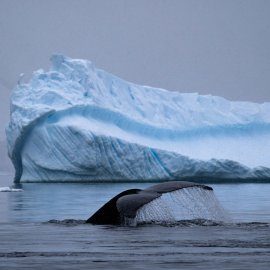Antarctica in Retrospect
-
English
-
ListenPause
[intro music]
Welcome to World Ocean Radio…
I’m Peter Neill, Director of the World Ocean Observatory.
Some weeks ago, World Ocean Radio aired Antarctica Prospect, my anticipations and aspirations for a privileged trip to the far south, to “nobody’s land,” from which I have now safely returned. Let me offer some Antarctica Retrospect.
The encounter was limited only by the vastness of the continent and means of accessibility – by ship from Ushuaia, Argentina, down the Beagle Channel, across the notorious Drake Passage, to the north coast of the Antarctica Peninsula, to the Eklund Islands off the continental mainland. Conditions for transit were deceptively calm. Excitement was high.
What followed left me speechless, an unusual, anomalous condition. I have distilled it all down to the idea of hallucination, a condition of mind transcended by the infinite stimulus before me. The dimensions were unlimited except for colored layers of dark or blue sky, streaks of red and yellow sunlight at dawn and dusk, bands of shifting grey fog, white levels and fragments of broken ice, lines of wind descending from the land to striate the water surface, and the ocean itself with its greens, and blues, and blacks at its declining depths. There were also marks of color: turquoise slashed in the glacial faces, deeper in the eroded caves and along the edges of the icebergs. There were sometimes minute punctuations of red, yellow, and green, of algae, moss, and seaweeds. A single orange starfish lay submerged in the rocks alongshore.
What further surprised was the sound: the absence of the constant ambient noise of so-called civilization, supplanted by the aural presence of sudden change of moving air aloft, the internal groans of the glaciers, the crack of calving ice, the gravel grinding at the tideline. There were also the calls of birds, the yawns of seals, the rush of penguins diving in and out of the sea, and the encircling expulsion of air by the humpbacks and other whales surrounding – a two-part blow, out, then in, like a submarine bellows. Our shouts of joy facing all this were lost in the cacophony of pure, natural life.
I felt as if I was present, not so much at the end of the earth, but at its beginning – the volcanic thrusts of granite and ice, the elemental movement of atmosphere and ocean, the emptiness that was the first garden before the invasion of predators and invasive species as specious as were we, eco-tourists, playing at exploration, bringing with us, inevitably, bits and pieces of our bad habits, extracting value as direct witnesses and indirect subverts of this awesome wildness. One night we slept out on the ice, and I felt nothing but insignificance and emptiness.
And guilt. Yes, I felt guilty for the privilege of being there, for the invisible damage I had collectively caused that underlay this beauty – the plastic, the acid, the particles and particulates of poisons that were already there and microscopically measurable even if unseen, for the insufficiency of response to problems known but left unsolved. It was a brutal confrontation with the inadequacy of our science, our politics, our sense of equity and justice, our human imagination. I confess an all-consuming anger that this place was subtly being consumed by the likes of me, and that it was evermore my duty, my obligation, my obsession, to inform, educate, proselytize, and act relentlessly to change my ways and ask others to join in changing theirs at a scale that can not only protect and conserve Antarctica but redress by acting and living differently as an individual, a citizen, and an advocate for solutions to the social crises we face through our ongoing indifference to the natural world. Did I have to go so far away to learn his?
In the end, what remains as conclusion? Despite the vastness and the power of the Antarctic landscape, I can think only of the fragility of it all – the dangers for the place and for ourselves if we remain unmoved and unmoving in our place and time. What will it take?
We will discuss these issues, and more, in future editions of World Ocean Radio.
[outro music]
World Ocean Radio host Peter Neill recently returned home from a trip to Antarctica aboard MS Island Sky with scientists from Woods Hole and a film crew from BBC-ONE, sharing insights and knowledge with other citizen scientists aboard. In this episode he offers reflections on his experiences in the last wilderness.
Do you prefer the written word? Head on over to Medium.com/@TheW2O.
About World Ocean Radio
Peter Neill, Director of the World Ocean Observatory and host of World Ocean Radio, provides coverage of a broad spectrum of ocean issues from science and education to advocacy and exemplary projects. World Ocean Radio is a weekly series of five-minute audio essays available for syndicated use at no cost by college and community radio stations worldwide.
Image Credit
James Eades
- Login to post comments



